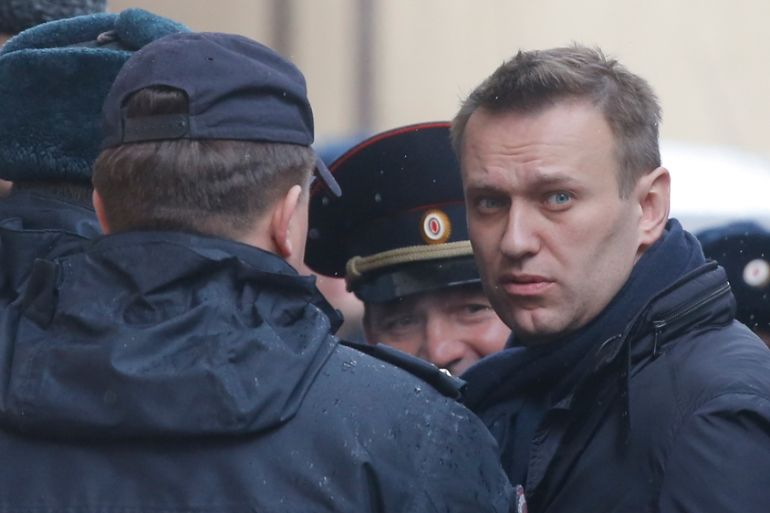Opposition leader Alexei Navalny appears in court
EU calls for release of prominent Kremlin critic Navalny, a day after he was detained at opposition protest in Moscow.

Russian opposition leader Alexei Navalny appeared in court on Monday, a day after being detained at a major opposition protest that he had organised.
Tens of thousands of protesters took to the streets across Russia on Sunday in the biggest show of defiance since the 2011-2012 anti-government protests.
Keep reading
list of 4 itemsNakba remembered: What is the right of return?
Palestinian life under Israeli occupation: An illustrated guideThis article will be opened in a new browser window
As Israel bombs Gaza, sirens echo in West Bank marking 76 years since Nakba
The Kremlin has dismissed the opposition as a Westernised urban elite disconnected from the issues faced by the poor in Russia’s far-flung regions, but Sunday’s protests included demonstrations in the areas which typically produce a high vote for President Vladimir Putin, from Siberia’s Chita to Dagestan’s Makhachkala.
PROFILE: Alexei Navalny, thorn in Putin’s side
Russian police say that about 500 people were arrested, while human rights groups say 1,000 were taken into custody. On Monday, the European Union called on Russian authorities to release the demonstrators.
The protests were led by Navalny, a charismatic opposition leader who has recently announced his bid for presidency.
Navalny was grabbed by police while walking to the rally from a nearby subway station. He posted a selfie on Twitter from the courtroom on Monday morning, saying: “A time will come when we’ll put them on trial too – and that time it will be fair.” If found guilty, he could be jailed for 15 days for staging an unauthorised rally.
|
|
The 40-year-old Navalny, arguably Russia’s most popular opposition leader, has been twice convicted on fraud and embezzlement charges that he has dismissed as politically motivated. Navalny is currently serving a suspended sentence, and Sunday’s arrest could be used as a pretext to convert it into jail time.
Separately, police arrested 17 associates of Navalny’s who were at their office setting up and monitoring a webcast of the rally. All of them spent the night at the police station and the authorities reportedly confiscated all their equipment. It was not immediately clear what charges they may be facing.
Whether Navalny and his associates will be slapped with new charges could indicate which approach the Kremlin will take in dealing with a new wave of discontent: crack down on it even further or exercise restraint.
Russian state television completely ignored the protests in their broadcasts on Sunday.
OPINION: Under surveillance in Russia
The demonstrations on Sunday were organised by Navalny, who urged people to take to the streets to demand the resignation of Prime Minister Dmitry Medvedev.
Navalny called for the protests after publishing a detailed report this month accusing Medvedev of controlling a property empire through a shadowy network of non-profit organisations.
Medvedev, who has so far made no comments on the claims, is accused of amassing a private collection of mansions, yachts and vineyards. The alleged luxuries include a house for raising ducks, thus many placards in the protests showed mocking images of a yellow toy duck.
Al Jazeera’s Rory Challands, reporting from Russia, said that the breadth and scale of Sunday’s protests had likely surprised both Navalny and the Kremlin; solidifying Navalny’s position as the pre-eminent opposition voice.
“Navalny’s message of anti-corruption has really struck a chord with Russians,” said Challands. “And going after Dmitry Medvedev, the prime minister, is pretty canny because – although Putin at the top of the tree is fairly unassailable – Dmitry Medvedev is a different political animal. He is much more vulnerable, much less popular, and putting pressure on him puts pressure on Vladimir Putin.”
|
|
Though criticised by some liberals for his anti-immigrant nationalist stance, Navalny has tapped into discontent among the young urban middle class with fiery speeches and Western-style campaigning.
Pavel Felgenhauer, a political analyst, told Al Jazeera that Navalny’s focus on corruption particularly resonated with young people – a demographic that is struggling under Russia’s economic stagnation and high unemployment – and brought them into the streets in large numbers.
“Now the authorities have to think what to do about that: most likely there will be a combination of kind of placating from one side and going and putting a lot of people behind bars,” said Felgenhauer.
Felgenhauer said that the authorities would be able to easily commute Navalny’s suspended sentence into an actual prison sentence.
“Most likely Navalny understands that, and actually being prosecuted in Russia gives you ‘points’,” said Felgenhauer. “He is playing the long game.”
But in an environment where the media and the political landscape are tightly controlled by the Kremlin, Navalny remains a fringe figure for most Russians, who are more likely to believe the official portrayal of him as a Western stooge and convicted criminal.
“Navalny is a unique politician of the younger generation,” Nikolai Petrov, a professor at the Higher School of Economics in Moscow, told AFP agency, adding that he had managed to develop a high profile “at a time when public politics has ceased to exist”.
|
|